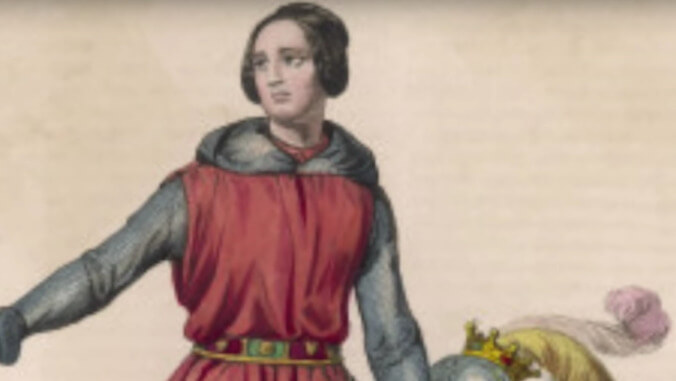We explore some of Wikipedia’s oddities in our 5,993,858-week series, Wiki Wormhole.
This week’s entry: Jeanne de Clisson
What it’s about: Pirates! But not just any pirate. While there were a small but significant number of female pirates, Jeanne de Clisson stood out for several reasons. For one, she was a noblewoman, born into a prominent French family and then married into two others in turn. Second, she enlisted in piracy as a widowed mother of seven, even taking two of her children to sea with her. And third, she wasn’t interested in treasure. She just wanted revenge.
Biggest controversy: As de Clisson lived in the early 1300s, many of her exploits are hearsay and there are a few gaps in her story. Historical records from both France and England, however, confirm several key facts. Her husband was executed by France as a traitor; she was convicted as a traitor by the French, and hailed as an ally by the English. The Breviary Of Belleville (de Clisson’s maiden name and hometown), an illuminated prayer book likely given to her as a wedding gift, ended up in the hands of Charles V, and survives to this day (or at least, survived long enough for a scanned image to be posted to Wikipedia).
Strangest fact: de Clisson married shockingly young, even by medieval standards. In 1312, at age 12, she married 19-year-old Geoffrey de Chȃteaubriant VIII. Jeanne gave birth to Geoffrey IX at 14, and daughter Louise two years later. Chȃteaubriant was her first of four husbands; he died in 1326. Two years later, she married Guy of Penthièvre, son of the Duke of Brittany, but the Duke’s family, worried the heir’s new bride wanted to somehow hone in on the family title, petitioned Pope John XXII to annul the marriage, which he did in 1330. Guy quickly remarried, and just as quickly died, leaving his estate to his daughter from his first marriage (presumably a son born to de Clisson would have overridden her claim).
The same year her second marriage was annulled, she married Olivier de Clisson IV (so named because he was lord of a castle in Clisson). Jeanne owned lands near Clisson, so between them the couple became the most powerful family in the region. They had five children, and if Wikipedia’s dates are correct, the first, Isabeau, was born five years before they were married, while Jeanne was still with her first husband. (Wikipedia only notes that Isabeau was born “out of wedlock.”)
Olivier fought for France during the Breton War Of Succession, and was captured by the English. When he was released for a surprisingly low ransom, the French suspected he was a traitor. With only this as evidence, French authorities arrested him while under the guise of a truce, and sent him to Paris to be executed, where his decapitated body was put on display. His head was shipped to Nantes and put on a spike. The nobility was shocked, both at the lack of presented evidence, and the treatment of his body, which “was reserved mainly for low-class criminals.”
Thing we were happiest to learn: Jeanne didn’t take her husband’s death lying down. She took her sons Olivier and Guillaume (then 7 and 5) to Nantes to see their father’s severed head, then swore revenge on his murderers. She sold her estates, “raised a force of loyal men,” and began attacking French outposts across Brittany. With help from the English, she outfitted three warships, painted black, with red sails, naming the flagship My Revenge.
For thirteen years, she sailed the English Channel, hunting down French ships, killing their crews, leaving only a few witnesses alive to send a message to the French king: The Lioness Of Brittany was out for blood.
Thing we were unhappiest to learn: Bring Your Kids To Work Day isn’t a great idea if you’re a pirate. In 1345, her flagship was sunk, and she, Olivier, and Guillaume were adrift for five days. The 7-year-old Guillaume died of exposure. (Her eldest son, from her first marriage, would die two years later fighting in the same Breton Succession wars that had claimed her third husband.) She still went back to sea, however, supplying the English Navy at the Battle Of Crécy the following year, and continuing to harry the French Navy for another decade.
Also noteworthy: In a rare turn of events for a pirate, de Clisson got out of the game without being killed or arrested, and settled down. In 1356, she married Walter Bentley, an English knight who served de Clisson’s ally and patron, Edward III. Bentley was awarded quite a bit of land in now-British-occupied Brittany for his contributions to the war effort, and Jeanne seems to have lived comfortably with her new husband, although she died three years after her final wedding of unknown causes.
Best link to elsewhere on Wikipedia: There are well over a hundred links to every pirate-related topic from Blackbeard to walking the plank to Treasure Island to Somali pirates hijacking the Quest in 2011 to cartoon air pirate Don Karnage. You could easily spend weeks on end exploring Davy Jones’ Locker via Wikipedia.
Further Down the Wormhole: One such link takes us to a moment when pirates weren’t just folk heroes, but actual American war heroes. In 1814, as New Orleans was facing an impending attack by the British Navy in the War of 1812, smuggler and privateer Jean Lafitte, in a rare moment of civic-mindedness, put together a pirate fleet to help win the Battle Of New Orleans. We’ll look at the decisive battle in a war that had already ended, next week.









































